"Song of Love" is a song recorded during an informal performance by Paul McCartney, singing and playing the piano at Twickenham Film Studios during the "Get Back Sessions" which were used to later produce both the Let It Be film and the album of the same name.
McCartney's lyrics for this song were inspired from the Song of Love (1947), starring Katharine Hepburn as Clara Wieck, which he combined with the music from Hungarian Dance No. 4 by Johannes Brahms.

Let It Be is the twelfth and final studio album by the English rock band the Beatles. It was released on 8 May 1970, almost a month after the group's public break-up, in tandem with the documentary of the same name. Concerned about recent friction within the band, Paul McCartney had conceived the project as an attempt to reinvigorate the group by returning to simpler rock 'n' roll configurations. Its rehearsals started at Twickenham Film Studios on 2 January 1969 as part of a planned television documentary showing the Beatles' return to live performance.

"Get Back" is a song recorded by the English rock band the Beatles and Billy Preston, written by Paul McCartney, and credited to the Lennon–McCartney partnership. It was originally released as a single on 11 April 1969 and credited to "The Beatles with Billy Preston". The song is one of the few examples of John Lennon featuring prominently as lead guitarist. The album version of this song contains a different mix that features a studio chat between Paul McCartney and John Lennon at the beginning, which lasts for 20 seconds before the song begins, also omitting the coda featured in the single version, and with a final dialogue taken from the Beatles' rooftop concert. This version became the closing track of Let It Be (1970), which was released just after the group split up. The single version was later issued on the compilation albums 1967–1970, 20 Greatest Hits, Past Masters, and 1.

"The Long and Winding Road" is a song by the English rock band the Beatles from their 1970 album Let It Be. It was written by Paul McCartney and credited to Lennon–McCartney. When issued as a single in May 1970, a month after the Beatles' break-up, it became the group's 20th and last number-one hit on the Billboard Hot 100 chart in the United States.
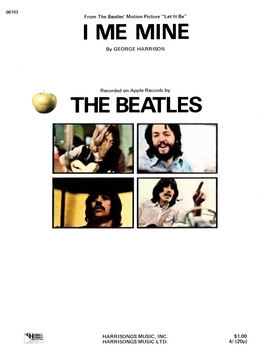
"I Me Mine" is a song by the English rock band the Beatles from their 1970 album Let It Be. Written by George Harrison, it was the last new track the group recorded before their break-up in April 1970. The song originated from their January 1969 rehearsals at Twickenham Film Studios when they were considering making a return to live performance. Written at a time of acrimony within the group, the lyrics lament humankind's propensity for self-centredness and serve as a comment on the discord that led to Harrison temporarily leaving the Beatles. The musical arrangement alternates between waltz-time verses and choruses played in the hard rock style.
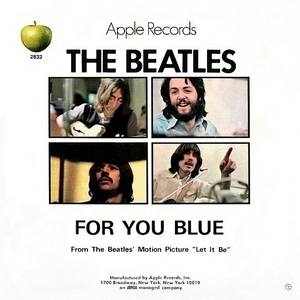
"For You Blue" is a song by the English rock band the Beatles from their 1970 album Let It Be. The track was written by George Harrison as a love song to his wife, Pattie Boyd. It was also the B-side to the "Long and Winding Road" single, issued in many countries, but not Britain, and was listed with that song when the single topped the US Billboard Hot 100 and Canada's national chart in June 1970. On the Cash Box Top 100 chart, which measured the US performance of single sides individually, "For You Blue" peaked at number 71.
"Watching Rainbows" is an unreleased song by the Beatles recorded on 14 January 1969 during the Get Back sessions at Twickenham Studios. It features John Lennon on lead vocal and electric piano, Paul McCartney on electric guitar, and Ringo Starr on drums. No bass guitar was present as McCartney was filling in for the absent George Harrison, who had temporarily left the group at that stage of the sessions. The song is played in two chords and has since been compared to "I Am the Walrus" and "I've Got a Feeling" for the similarities in the song's lyrics and structure.
"Dig a Pony" is a song by the English rock band the Beatles from their 1970 album Let It Be. It was written by John Lennon and credited to Lennon–McCartney. The band recorded the song on 30 January 1969, during their rooftop concert at the Apple Corps building on Savile Row in central London.

"Dig It" is a song by the English rock band the Beatles from their 1970 album Let It Be. The song is credited to Lennon/McCartney/Harrison/Starkey, and is one of the few songs to be credited to all of the Beatles. This song and the 39-second "Maggie Mae" appear on the Let It Be album, but are excluded from the Let It Be... Naked album, instead being replaced with "Don't Let Me Down". Glyn Johns' May 1969 version of the album, then titled Get Back, had a four-minute excerpt of "Dig It", which was later reduced to the much shorter version in the final album.
"All Things Must Pass" is a song by English rock musician George Harrison, issued in November 1970 as the title track to his triple album of the same name. Billy Preston released the song originally – as "All Things (Must) Pass" – on his Apple Records album Encouraging Words (1970) after the Beatles had rehearsed the song in January 1969 but did not include it on their Let It Be album. The composition reflects the influence of the Band's sound and communal music-making on Harrison, after he had spent time with the group in Woodstock, New York, in late 1968. In his lyrics, Harrison drew inspiration from Timothy Leary's poem "All Things Pass", a psychedelic adaptation of the Tao Te Ching.

Let It Be is a 1970 British documentary film starring the Beatles and directed by Michael Lindsay-Hogg. The film documents the group's rehearsing and recording songs in January 1969 for what was to become their twelfth and final studio album Let It Be. The film includes an unannounced rooftop concert by the group, the last public performance of the four together.

"Teddy Boy" is a song by Paul McCartney included on his first solo album McCartney, released in April 1970. According to Ernie Santosuosso of The Boston Globe, it describes the way in which a close relationship between a widow and her grown son Teddy boy is destroyed by her new romantic interest.

"The Back Seat of My Car" is a song written by Paul McCartney, released as the closing track of his and his wife Linda's 1971 album, Ram. Several months later, it was released as a single in the UK, peaking at number 39. The song modulates stylistically between a sweeping piano-and-orchestra ballad similar to McCartney's "The Long and Winding Road" and upbeat rock sections before ending in a raucous and passionate finale.
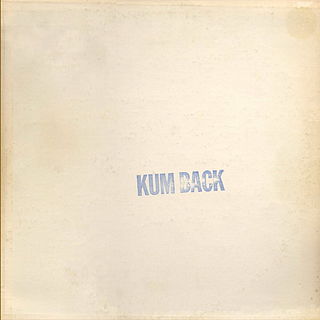
Kum Back is the first bootleg album by the Beatles, released in January 1970. The album is an early version of what would become Let It Be, sourced from a tape recording of an acetate prepared by the band's engineer, Glyn Johns. It is one of the earliest commercial rock bootlegs, the first being Great White Wonder by Bob Dylan which was released several months earlier.

"Junk" is a song written by English musician Paul McCartney and released on his debut studio album McCartney (1970). He wrote the song in 1968 with the Beatles while the group were studying Transcendental Meditation in India. After the band's return from India, he recorded the song as a demo at Kinfauns, George Harrison's home, before sessions for The Beatles took place. It was ultimately passed over for inclusion on The Beatles and Abbey Road in 1969. After the group's break-up, McCartney recorded the song for inclusion on McCartney. The lyrics describe various items in a junkyard. A slightly longer, instrumental version of the song, titled "Singalong Junk", also appears on the album.
"Hallelujah I Love Her So" is a single by American musician Ray Charles. The rhythm and blues song was written and released by Charles in 1956 on the Atlantic label, and in 1957 it was included on his self-titled debut LP, also released on Atlantic. The song peaked at number five on the Billboard R&B chart. It is loosely based on 'Get It Over Baby' by Ike Turner (1953).
"Madman" is an unfinished song that was recorded by the Beatles in January 1969 during the Get Back sessions.
"Thinking of Linking" is one of the first songs written by English musician Paul McCartney. Inspired by a cinema advertisement for Link Furniture, McCartney composed the song in 1958. The lyric consists of only three lines, while the music is influenced by the sound of Buddy Holly and the Crickets, particularly the song "Peggy Sue Got Married".

"Little Queenie" is a song written and recorded by Chuck Berry. Released in March 1959 as a double A-side single with "Almost Grown", it was included on Chuck Berry Is on Top (1959), Berry's first compilation album. He performed the song in the movies Go, Johnny Go! (1959) and Hail! Hail! Rock 'n' Roll (1987). One year earlier, Berry had released "Run Rudolph Run", a Christmas song with the same melody.
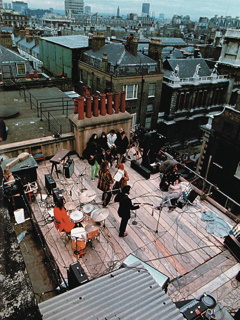
On 30 January 1969, the Beatles performed an impromptu concert from the rooftop of their Apple Corps headquarters at 3 Savile Row, in central London's office and fashion district. Joined by guest keyboardist Billy Preston, the band played a 42-minute set before the Metropolitan Police arrived and ordered them to reduce the volume. It was the final public performance of their career. They performed nine takes of five new songs as crowds of onlookers, many on lunch breaks, congregated in the streets and on the rooftops of nearby buildings to listen. The concert ended with "Get Back", and John Lennon joking, "I'd like to say thank you on behalf of the group and ourselves, and I hope we've passed the audition."
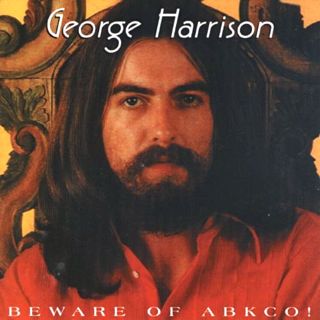
Beware of ABKCO! is a bootleg album of songs performed by English rock musician George Harrison in May 1970. It contains songs that were under consideration for Harrison's triple album All Things Must Pass, his first release as a solo artist following the break-up of the Beatles. The performances were taped in a single session at Abbey Road Studios in London, on 27 May 1970, for the benefit of Harrison's co-producer, Phil Spector. Seven of the fifteen songs were subsequently recorded formally for inclusion on All Things Must Pass, as was "Everybody, Nobody" after Harrison reworked it as "Ballad of Sir Frankie Crisp ". From its 1994 release by Strawberry Records, the bootleg provided the only available record of five songs that Harrison never revisited during his career. Among these is a 1968 collaboration with Bob Dylan titled "Nowhere to Go". All fifteen songs were officially released in August 2021, as part of the Uber and Super deluxe editions of the All Things Must Pass: 50th Anniversary box set.